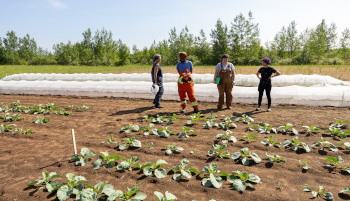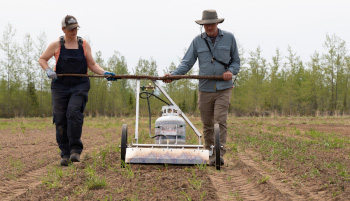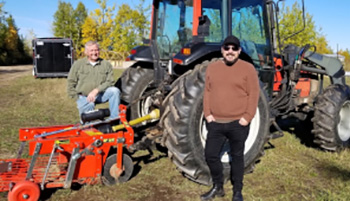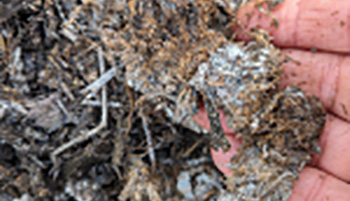For more information
Media Relations
Agriculture and Agri-Food Canada
1-866-345-7972
aafc.mediarelations-relationsmedias.aac@agr.gc.ca
Agriculture might not be the first thing Canadians think of when referring to Northern Canada, but Northerners have always worked to adapt and develop their own sustainable food systems, even in the face of unique challenges such as short growing seasons and long, easily disrupted supply chains. In 2018, Agriculture and Agri-Food Canada’s (AAFC) St. John's Research and Development Centre began focusing research efforts on supporting sustainable boreal-northern agriculture systems, including expanding research collaborations with farmers and communities in Labrador. This venture into Labrador resulted in research projects and the hiring of the first two AAFC researchers based in Labrador, Dr. Erica Oberndorfer and Marilyn Faulkner.
Around the same time, in 2019, the Labrador Campus of Memorial University of Newfoundland and Labrador acquired the lease of an 80-acre farm in Happy Valley-Goose Bay, Labrador, and created the Pye Centre for Northern Boreal Food Systems. The Pye Centre is a research, education, and wellness farm, focused on acting as a vibrant community-led hub that is leading northern-focused food systems research, production, and distribution in Labrador.
AAFC has a long history of collaborating with Memorial University. The prospect of working together in Labrador and sharing resources to continue studying agriculture in a northern region with local farmers, was exciting for both organizations.
A budding partnership
AAFC and the Pye Centre share many of the same research priorities. It made perfect sense to join forces for the benefit of northern agriculture, local food security, and shared learning.
"Both organizations, at the core of what we do, want to help farmers effectively grow crops in the north," says Jamie Jackman, Program Coordinator at the Pye Centre. "In the beginning, we met with local farmers as well as representatives of Indigenous governing bodies, community non-profits, different levels of government, and the community in general to ensure our goals and our vision aligned with their priorities. We wanted to communicate our intention of working together to develop and grow, in order to truly become a community-led and focused centre for food systems research, education, and outreach. At the time, AAFC was already doing research with local farmers, and they basically said, ‘we 100% support your vision and want to help achieve our goals together.’"
After many discussions and priority-setting exercises, AAFC and the Pye Centre partnered in 2020 to establish on-farm trials in Happy Valley-Goose Bay to enhance food security and benefit the local agriculture industry. Before long, the partnership was flourishing and both organizations have grown together ever since. They support each other by sharing resources, technical and scientific expertise. AAFC uses several acres of land at the Pye Centre. Researchers study farming practices using infrastructure, equipment and support from staff, and community relationships. Resident farmer, Lem Seaward, who has more than 20 years of farming experience in Labrador, also provides invaluable farming expertise.
"Working on local farmers’ land gave us a tremendous start to researching in the North. Now, the Pye Centre gives us the opportunity to take more risks with our research, and we can continue to lean on local growers for their expertise without the burden of tying up their land."
- Dr. Julia Wheeler, Research Scientist, Agriculture and Agri-Food Canada
Lem Seaward added that, "the dynamics between farmers and the working relationship with AAFC is amazing. They are very open-minded and can draw on a lot of their resources and expertise. That’s a huge difference for us and puts us forward by years."
Yielding success together
The partnership is already providing great outcomes for farmers including new strategies for extending the growing season, controlling insects, soil amendments and other best practices. Three scientists from AAFC St. John’s Research and Development Centre, Dr. Julia Wheeler, Dr. Linda Jewell, and Dr. Sean McCann, conduct research at the Pye Centre, with support from Ottawa-based Soil Biochemistry Technician, Ulrica McKim, and Labrador-based scientist, Dr. Erica Oberndorfer.
As part of the farmers circle meeting at the Pye Centre, local producers expressed the need for more research to be done on what they call ‘the big four crops’ – potato, carrot, rutabaga, and cabbage. It is sound advice that AAFC scientists put into practice, as Dr. Wheeler and Dr. Jewell recently completed their final season of a project studying season extension technologies for these crops, in addition to green beans. They hope to be able to share promising results in early 2024. Studies are ongoing to determine which crop varieties might fare better in northern climates. Dr. McCann is studying alternatives to pesticides for controlling insects, such as the use of netting to reduce diamondback moths in rutabaga crops, as well as intercropping (the planting of two or more different crops at once) to control pests in cabbage crops. Local farmers can stop by the research trials to see these technologies in action.
The research on compost, led by Ulrica McKim, is very encouraging. Farmers explained that there is little organic matter in Labrador soils, requiring costly inputs such as fertilizer to improve soil conditions. AAFC and the Pye Centre researched the effectiveness of a passively aerated static pile compost system in boosting soil organic matter in northern agriculture fields. The method is simple – compost is developed using local organic materials such as manure, straw, leaves from old plants, shredded cardboard, and chipped brush from ditches which is then mixed in a large pile, with perforated piping installed to allow fresh air to travel through the pile. The team found that this method is cost effective, simple for farmers, and boasted huge results in just a short time. After about a year, farmers can turn these locally-sourced materials into a high-quality amendment that can provide organic matter and nutrients to enrich the soil and support healthy crop growth. The project was recently presented to local farmers and Lem explained, "they loved it. It’s getting attention from all over Labrador."
The Newfoundland and Labrador Living Lab also has a dedicated site at the Pye Centre. Part of the AAFC Agricultural Climate Solutions — Living Labs program, this Living Lab brings together farmers, scientists, and representatives from other sector stakeholders to co-develop and test innovative technologies and on-farm practices to reduce greenhouse gas emissions and sequester carbon in real-world conditions. Led by the Newfoundland and Labrador Federation of Agriculture, the project brings together researchers from AAFC and Memorial University. They are currently testing biochar (a carbon-rich material made up of organic residues such as plants and wood waste) and compost to increase soil health and yields, capture carbon and reduce greenhouse gas emissions.
The research not only benefits farmers, but also local communities – much of what is grown by AAFC and the Pye Centre gets donated to local community organizations, such as food banks. AAFC also provides job opportunities for local youth through the Federal Student Work Experience Program, by hiring students each summer to help with research at the Pye Centre. The blossoming partnership between AAFC and the Pye Centre is a win for everyone!
"It’s not just about the research, AAFC scientists go out of their way to support Labrador communities by participating in science camps and research weeks. They communicate so well with our youth. They are a shining example of how you work with a community."
- Jamie Jackman, Program Coordinator, Pye Centre for Northern Boreal Food Systems
"Our relationship with the Pye Centre and their expertise is so valuable. AAFC research projects in central Labrador benefit enormously from their support. We are so grateful for this partnership to support northern agriculture and local communities."
- Dr. Linda Jewell, Research Scientist, Agriculture and Agri-Food Canada
Key discoveries and benefits
- A flourishing partnership between AAFC and the Pye Centre began in 2020. Both organizations support each other by sharing resources, technical and scientific expertise among scientists, students and Pye Centre staff.
- Three scientists from AAFC St. John’s Research and Development Centre, Dr. Julia Wheeler, Dr. Linda Jewell, and Dr. Sean McCann, conduct research to study farming practices that can extend the season for northern farmers, reduce pests, improve soil health and more, with support from Ottawa-based Soil Biochemistry Technician, Ulrica McKim, and Labrador-based scientist, Dr. Erica Oberndorfer.
- AAFC and the Pye Centre researched the effectiveness of a passively aerated static pile compost system using local organic materials such as manure, straw, old cabbage leaves, shredded cardboard, and chipped brush from ditches and then mixed in a large pile. The team found that, after about a year, farmers can turn these locally-sourced materials into a high-quality amendment that can provide organic matter and nutrients to enrich the soil and support healthy crop growth.
- The research not only benefits farmers, but also local communities – much of what is grown by AAFC and the Pye Centre gets donated to local community organizations, such as food banks.
Photo gallery

Dr. Linda Jewell (right) along with researchers Tara Ryan, Machel Thomas and Dr. Carolyn Parsons (right to left), are studying season extension technologies at the Pye Centre.

Dr. Sean McCann (right) with AAFC research assistant, Dena Wiseman, researching alternatives to pesticides for controlling insects in Labrador.

The Pye Centre employees, Lem Seward (left) and Jamie Jackman are instrumental in the partnership with AAFC research scientists.

Researchers have turned locally-sourced materials into a high-quality organic addition to soils, that can provide organic matter and nutrients to enrich the soil and support healthy crop growth.